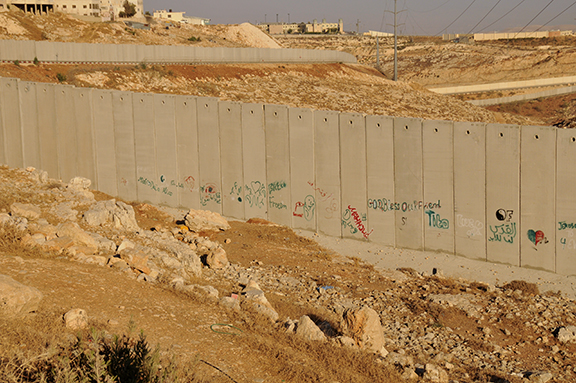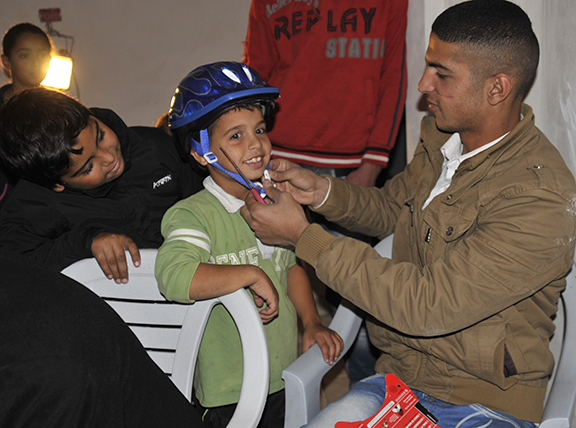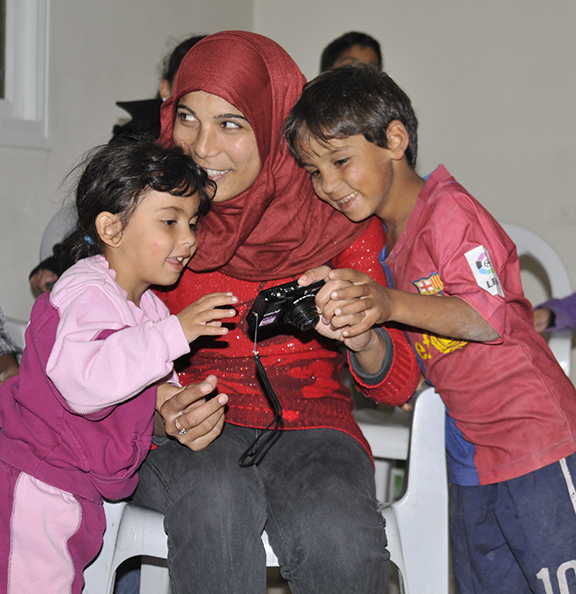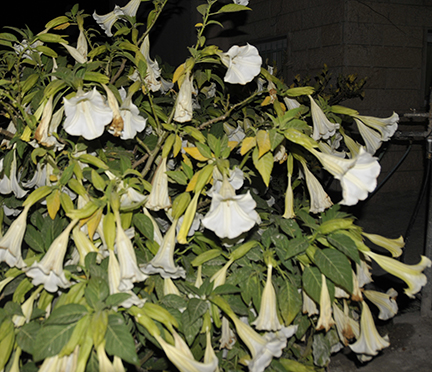By Ellen Davidson
The six-member Veterans Peace Team delegation to Palestine hit the ground with, as Mike Hastie put it, “our track shoes on.”
We had come to Palestine to participate in the struggle against the U.S.-backed Israeli occupation. Five of the six are U.S. military veterans who feel a special obligation to stand in solidarity with the Palestinian people, given the massive military and economic aid our government provides to Israel. Besides meeting with ex-fighters from Israel and Palestine who are working for peace and justice, the delegation, comprising three men and three women, plans to join in direct action such as the weekly demonstrations in many villages against construction of the “apartheid wall,” which frequently cuts residents off from their agricultural lands.
After a morning getting cell phones working, picking up the banners and Veterans For Peace flags and t-shirts we had mailed from home (in case Israeli immigration inspected our luggage), and walking around the Old City of Jerusalem, we ventured out to catch the 21 bus to Bethlehem. We were carrying gifts our Palestinian friend Taha in New York had asked us to take to his family in the village of Al Walaja.
En route, we were called by a friend of Taha who promised to meet us at the bus. As if a group of six confused and jetlagged Americans weren’t enough to identify us, I told him he could spot us by the giant flowered purple suitcase Taha had packed the presents in—much to the embarrassment of Tarak Kauff, who had to roll what he called a “girly” bag through the New York and Tel Aviv airports.
When we stepped off the bus, we were immediately surrounded by taxi drivers offering to take us to the Church of the Nativity, the main visitor attraction in Bethlehem. Due to Israeli checkpoints and the ubiquitous 26-foot concrete “separation barrier” that snakes through and around Bethlehem and nearby Jerusalem, the tourist trade isn’t all it could be. I called our contact and tried to explain exactly where we were by reading the names on nearby buildings. One cabby cheerfully interrupted, asking if my friend spoke “Araby,” and then took the phone from me, explaining our location in great detail.
After a wild cab ride through narrow winding streets down into a steep valley, we arrived at Taha’s family home. This is when you really know you are in Palestine. The warm hospitality is unmistakable—first we were served coffee in an upstairs room. We presented the gifts and Taha was contacted on Skype to join the revelry and watch his nephew try on his new bicycle helmet. More and more adults and children crowded into the room to greet us and be part of the festivities.
We were moved downstairs for delicious mint tea, followed by what was called a “simple dinner,” a delicious concoction of chicken and rice with almonds and chick peas with yoghurt. Throughout, the children came in and out, laughing and shouting. No one shushed them, no one discouraged them from climbing into laps or helping themselves to food. Again, this centrality of children in the family life is markedly different from the culture we came from.
As we got to know each other, the conversation moved from the latest news on Taha to what we are doing in Palestine and how the occupation has affected Al Walaja. We heard the history of the village, how it was originally located several miles away until its occupants were forced out in 1948, how the nearby settlements of Gillo and Har Gillo have effected a land grab. Taha’s father, born in 1942, spoke of his early childhood, before the “naqba,” or “disaster,” of 1948: “We were happy, we had a better life, we had vegetables, fruit, spring water. One day, one night, we started hearing bullets, tanks. We were so scared, we left everything in the houses. We thought we would bring our clothes, etc., later. But when Taha’s grandmother went back to collect her things, she was shot and wounded.”
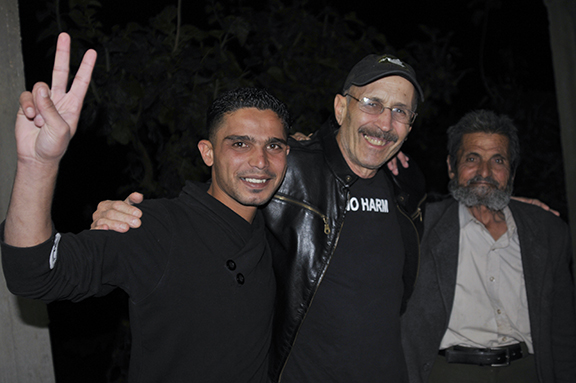
Taha’s brother (left) and father (right) with Veteran For Peace member Tarak Kauff. Photo by ELLEN DAVIDSON
Taha’s sister-in-law Fatma described going to visit her own father, who has been in prison 22 years, since she was six years old: “I go through a process of checkpoints, bus to bus, and then they give me 45 minutes and we can only talk on a telephone.”
VPT member Mike Hastie told the family that our country, in supporting the Israeli occupation and maintaining its own occupations throughout the world, is on the verge of moral collapse. He cited Martin Luther King Jr., who was killed exactly a year to the day after he said “[a] nation that continues year after year to spend more money on military defense than on programs of social uplift is approaching spiritual death.” “Of course,” muttered Fatma in agreement.
Milad discussed his work with the House of Hope, a Christian peace organization. He wanted people outside Israel, especially in the Islamophobia-plagued United States, to understand that Palestinian Christians also suffer under the Israeli occupation. He spoke movingly of how he barely made it to see his mother before she died of cancer. Because he lives on the West Bank, he had to apply for a permit to visit the Christian-Lutheran Hospital in Jerusalem. His requests were repeatedly denied until he was finally allowed to see his mother, who died just as he arrived.
“I was born in Jerusalem,” he said. “Then, during the second intifada, all of a sudden I am on the West Bank.” This process of reclassifying Jerusalem neighborhoods as belonging to the West Bank, while incorporating Israeli settlements outside of the city into the municipal boundaries, has resulted in thousands of Palestinians losing their Jerusalem residency permits, while keeping the Jewish-Palestinian demographic balance of the city tilted toward Israeli Jews, many of whom are recent immigrants. “When I go to Jerusalem,” Milad went on, “sometimes a Russian stops me, sometimes an Ethiopian stops me, sometimes I-don’t-know-where-he-is-from stops me, and they don’t know anything about Jerusalem, but they say, ‘Go back home; you can’t be here in Israel,’ and I have a trauma from this.”
Mirroring this, VPT member Ken Mayers spoke of how he first realized that Israel was not the “land without people for a people without land” he had grown up hearing about. He told the story of swapping babysitting in graduate school with his neighbor, a Palestinian refugee who had grown up in Jordan. “I grew up in Jerusalem, but I can’t go to Jerusalem,” his neighbor told him, “but you’ve never been to Jerusalem and you [as a Jew] can go there any time, or even become a citizen.”
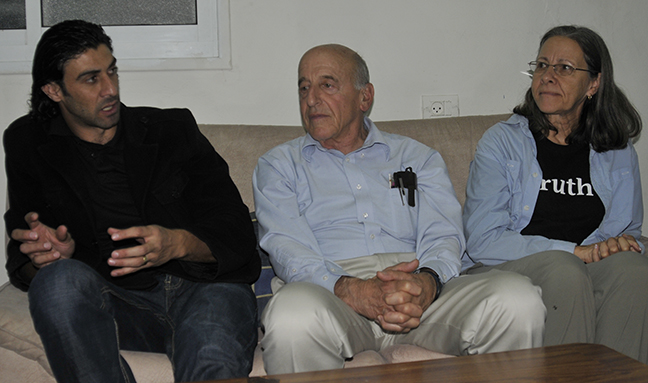
VPT delegation members Ken Mayers and Lorna Vander Zanden listen to Milad describing life under occupation. Photo by ELLEN DAVIDSON
Ken described the Israeli occupation as “the learned cruelty from centuries of European Jews living in ghettoes, centuries of learning [from their oppressors] how you behave when you’re on top.” But, he continued, just as the Grand Canyon was formed by “just drop of water, drop of water over time, wearing against the stone, we’re like drops of water moving against the current.”
As we left Taha’s family, his father handed us a bouquet cut from the divine-smelling trumpet flower bush growing in front of their house, one more act of generosity from a people with little enough for themselves toward citizens of the country that makes their oppression possible.
* * *
Postscript: On the way back to Jerusalem, our bus was waved over at a checkpoint. Two soldiers carrying rifles, one of them oddly dressed in running shorts, boarded, walked halfway back, and then exited, paying no attention to the six of us and the sole other passenger, a Palestinian woman. For some of us, it was the first encounter with an Israeli checkpoint, but it will certainly not be our last on this trip.

